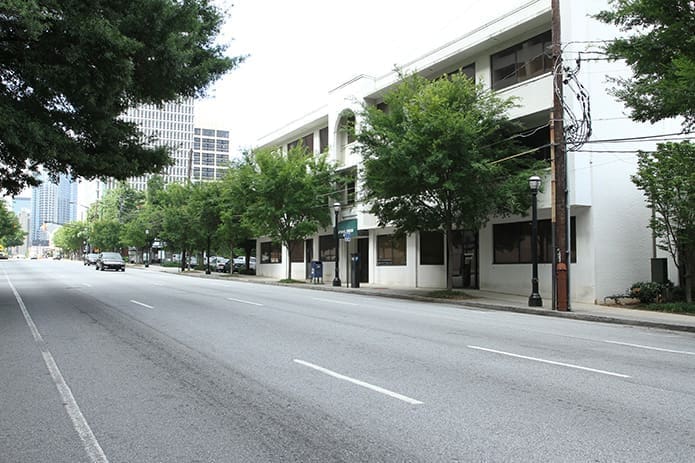 Photo By Michael Alexander
Photo By Michael AlexanderAtlanta
Cristo Rey to open in Midtown
By ANDREW NELSON, Staff Writer | Published July 18, 2013
ATLANTA—The city’s next Catholic school is to open its doors in Midtown Atlanta.
Students attending Cristo Rey Atlanta Jesuit High School in the fall of 2014 will be learning in a renovated version of 680 West Peachtree Street, the former headquarters of the Atlanta Archdiocese.
Organizers hope the accessible location helps the school attract a diverse student body and the nearby MARTA transit system will let students reach their work-study jobs.
“If you can get to MARTA, you can get there,” said Deacon Bill Garrett, the president of the school.
The Atlanta school will be one of the newest members of the Cristo Rey network of Catholic high schools, which serve low-income students with a college-prep education and work experience in a corporate office. There are about two-dozen similar schools around the country. It will also be one of 11 schools nationwide sponsored by the Jesuits.
A strategic review by the archdiocese of Catholic education in Atlanta revealed the tuition was out of reach for low-income families. Out of the strategic plan grew an effort to better serve those families.
“That’s really the niche that Cristo Rey fills. It is exclusively for low-income kids. According to the archdiocesan statistics, about 7 percent of students in the archdiocesan school system (receive) free or reduced lunch. Our expectation is nearly 100 percent of our students would be on free or reduced lunch,” said Deacon Garrett.
The expected tuition that families will be asked to contribute will be about $1,000 a year.
The school signed a three-year lease on the Midtown building. Most of the administration and departments of the archdiocese moved to the Chancery building in Smyrna close to two years ago. The West Peachtree building still housed offices of Catholic Charities Atlanta, which are expected to move to Smyrna.
School leaders want to attract students from every ethnic and racial background. Other Cristo Rey schools have found a school’s neighborhood location can determine the entire racial makeup of the student body. The location in the Midtown business district avoids that. The goal is to have one-third of the students be Hispanic, a third African-American and a third a “melting pot” of cultures. Students do not have to be Catholic.
“We’re going to be blind toward a faith tradition. But we are not going to be blind to recruit a diverse population,” Deacon Garrett said.
A unique feature of the school is its corporate work-study program. A student spends most of the week in the classroom. But the young person also works in an office one day each week, and sometimes two.
The work experience exposes students to an office culture, expectations of how to talk on the phone in an office or dress for business, and the experience over four years can make them stand out when they apply for college. The exposure also helps students think about their future.
“You better decide what kind of job you want to have,” he said.
“We want to expose our student population to a corporate environment where they are working in big industry,” Deacon Garrett said, instead of low-wage service jobs. “For a long-term job, that is not the type of economic stability that families need.”

Deacon Bill Garrett is the president of Cristo Rey Atlanta Jesuit High School. The school will open in 2014. Photo By Michael Alexander
Thirty-eight businesses have agreed to hire the students, including large firms like UPS, SunTrust Bank, and many large Atlanta law firms, along with smaller companies. The students are paid, but the money reverts to the school to cover tuition. If the student works during the summer, the student keeps the money.
Piedmont Healthcare is on board.
“We were impressed by the model from the moment we heard it described. Students from disadvantaged families deserve the hope of breaking the cycle of poverty that this school can offer. I look forward to the prospect of Piedmont Healthcare’s support of this important initiative,” said Jay D. Mitchell, the executive vice president and general counsel at Piedmont Healthcare.
Rollins Inc., the pest control giant, is also participating.
“At Rollins, we are committed to what we believe is a key solution to changing the future of those less fortunate: education. We look forward to working with Cristo Rey High School,” said Henry Anthony, the vice president of human resources.
The work program also covers a large share, some 60 percent, of the actual cost of education, estimated at $12,000 a year. Other sources of income will be tuition, philanthropy and the Grace Scholars education tax credit program.
The plan is to start with 125 freshmen and add a freshman class a year until enrollment reaches 500 students.
Many of the students will be a grade or two behind in learning, so the school will be challenged to cover six years of education in four years, said Deacon Garrett. That isn’t a small hurdle and some students leave the school because of it, he said. About 60 percent of students who enter the school graduate, he said. One hundred percent of its graduates attend a four-year or two-year college.
As a Jesuit school, there will be a Jesuit priest leading as the principal and at least one faculty member is going to be a Jesuit. Deacon Garrett said the religious order is committed to this program because it reflects the Jesuits’ mission for a preferential option for the poor.